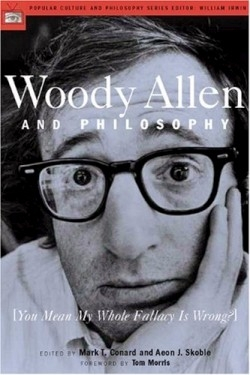Woody Allen and Philosophy
You Mean My Whole Fallacy is Wrong?
Something about a Woody Allen film invites analysis. People seldom call it a mere “movie,” perhaps automatically believing that his work belongs in the category of art or social commentary. It could be those moments in which the director/actor looks into the camera with his big, black-framed eyeglasses and, comedy aside, tosses a universal truth at the viewer that gets people talking as they leave the theater. Perhaps that’s why fifteen philosophers and college professors each contributed an essay addressing various social issues and philosophical questions raised by Woody Allen in his movies and writings.
This book is Part Eight in a series called “Popular Culture and Philosophy” that includes essays addressing Seinfeld, The Simpsons, The Matrix, Lord of the Rings, and Buffy the Vampire Slayer. In this series, the editors and contributors seek to introduce philosophy to people who are not likely to be familiar with this school of thought, through the use of popular television shows, movies, and novels, and their philosophical messages.
Allen’s works have some recurring themes, such as mortality and the meaning of life, and the contributors discuss them at length. The movie Annie Hall, for example, contains a scene in which a young man, refusing to do his homework, is brought to the doctor by his mother for an examination. The despondent boy explains that the universe is expanding and will eventually explode, so what’s the point of doing anything, since nothing will endure and life is pointless.
The editors, both teachers of philosophy (Conard at Marymount Manhattan College, and Skoble at Bridgewater State College, Massachusetts), claim that no previous knowledge of philosophy is necessary to enjoy this book, but some readers may find some of these essays daunting. The mere mention of names like Schopenhauer, Kant, Kierkegaard, and Nietzsche, especially to those who barely survived Philosophy 101, could send a reader scampering. In fact, James Wallace, in his essay “The Mousetrap: Reading Woody Allen,” writes: “Allen’s best work is written for the same intelligent audience he enjoys poking fun at—intellectuals. Because of his colossal, boundless imagination and expansive knowledge of politics, philosophy … and just about every other category of learning, reading Allen is a task more easily accomplished by readers with as vast a store of knowledge and as fluid a mind as his, or at least something close. Surely his biggest fans are exceptionally well-educated and well-read.”
Those who stick with this book will experience their next Woody Allen encounter at a much deeper level—and in true Woody Allen fashion, probably feel guilty about it.
Reviewed by
Karl Kunkel
Disclosure: This article is not an endorsement, but a review. The publisher of this book provided free copies of the book to have their book reviewed by a professional reviewer. No fee was paid by the publisher for this review. Foreword Reviews only recommends books that we love. Foreword Magazine, Inc. is disclosing this in accordance with the Federal Trade Commission’s 16 CFR, Part 255.

